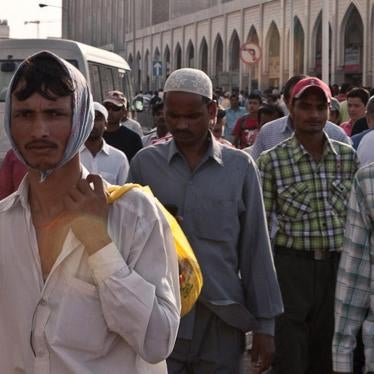The challenge for UK firms is a serious one - how to conform to the industry’s best practices which they preach in a country where the standard practice is so poor?
As British and Qatari Royals inaugurated the Shard - London’s newest tower and the tallest building in Europe – last week, an equally significant event with an altogether lower profile had just drawn to a close across town. The Qatari-funded Shard’s 310 metres may have garnered the column inches, with some commentators objecting on aesthetic grounds, but the attention of the UK construction industry was fixed firmly on Qatar itself and the $140 billion in contracts discussed at the Qatar Infrastructure Projects conference in London’s Jumeirah Carlton Tower Hotel. British industry should beware: it is queuing up to enter a market characterised by regulatory shortcomings and serious exploitation.
Qatar’s construction boom is the result of its winning bid for the 2022 World Cup, for which it has committed to build nine new stadiums and to undertake massive infrastructure projects. Qatari nationals number only 300,000 yet the country plans to spend $39 billion (a staggering 10 per cent of gross domestic product) on projects and infrastructure this year and next, according to a June 2012 report from the Qatar General Secretariat for Development Planning. It is estimated that nearly one million extra workers from countries such as India, Bangladesh and Nepal will be required to meet the demand for labour over the next ten years.
At the London conference, which was organised privately rather than by the Qatari government, a brochure outlining how to do business in Qatar observed that “the low-paid construction worker is, in theory, treated in the same manner as a highly paid lawyer”. The theory is quite correct, but as a recent investigation by Human Rights Watch showed, it bears no relation to reality. South Asian labourers typically work 10 hours a day, six days a week in temperatures that often exceed 40C. Many endure unpaid wages, illegal salary deductions, or crowded and unsanitary residential camps.
Qatari law prohibits the confiscation of passports, yet almost all workers interviewed by Human Rights Watch reported that their passports had been confiscated on arrival. Qatari law prohibits employers and manpower agents from charging recruitment fees, yet 69 of the 73 workers interviewed by Human Rights Watch had paid recruitment fees of between $726 and $3651. A World Bank study from 2011 found that agent commission fees of between $17 and $34 million flow annually from Nepal (GNI/capita $438) to Qatar (GNI/capita $61,532) One academic called it a system “fully capable of separating [workers] from the tiny fortunes they and their families have invested in sending them to the Gulf in the first place”.
The Qatari government routinely and rigorously enforces some of its laws - those that grant employers extensive control over migrant workers. Its most problematic regulations include the kafala system of sponsorship-based employment, which ties workers to one employer; and an exit visa requirement, which allows employers to prevent workers from leaving the country without their permission.
The Qatari Ministry of Labour told Human Rights Watch that it was “inconceivable”that forced labour existed in the country. Quite the contrary is true. In view of the inadequacies of the legal and regulatory framework in Qatar, UK construction firms will have to take positive steps to ensure that workers’conditions do not amount to forced labour.
With business at home weak, British construction firms are eagerly eyeing the Qatari market. Activity in the UK construction domestic sector fell last month at its fastest pace in more than two and-a-half years and output and new orders have fallen significantly since the turn of the year. The challenge for UK firms is therefore a serious one - how to conform to the industry’s best practices which they preach in a country where the standard practice is so poor?
This is a challenge they must be prepared to meet if they want their public corporate responsibility commitments to be anything other than rhetoric. There is cause for cautious optimism, as the Qatari government says that it is considering revising some labour laws. The Shard now provides an ever-visible, pointed reminder of Qatari wealth. Qatar faces few financial barriers to reforming its labour market, but that reform will not happen overnight, and in the areas where the government has pledged reform its plans do not meet international standards.
The awkward reality for UK firms is that they will have to go beyond Qatari laws and standards if they are to adhere to their own codes of conduct, protect their reputations, and ensure the rights of their workforce. At the very least, this should mean that the firms should commit publicly to fair treatment: no workers will be charged recruitment fees and any who pay will be reimbursed, all workers will retain their passports, and all projects will be subject to independent monitoring to ensure that workers receive monthly salaries without illegal deductions, and can quit their jobs without fearing imprisonment and deportation.
It is the Shard which has provoked a backlash from aesthestes, but it is among the foreign labourers of Doha where the unsightly reality of Qatar’s global ambitions is most obviously manifest.
Nicholas McGeehan is working as a special advisor to Human Rights Watch on its campaign to improve migrant workers' rights in Qatar in the run up to the 2022 World Cup.







